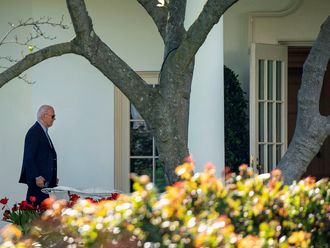Buenos Aires: Maximiliano Ruiz was not expecting a call from Argentina’s National Commission for the Right to Identity. He already knew his identity — or so he thought.
He was 40, the happy son of middle-class parents. The first person in his family to become a doctor.
Then, in May, the call came. His parents, the commission suspected, were not his biological ones. His younger sister Marina was not his blood sister.
His father was a Marxist guerrilla, murdered by military dictators.
The governmental commission searches for people who were taken from their mothers as babies and adopted by other families under the 1976-1983 regime.
“I was surprised by the call. But I was sure it wasn’t me they were looking for,” Ruiz told journalists.
“I had not suspected it. I did not even know that the parents who raised me were not my biological parents.”
Genetic tests were recommended. The call had sowed doubt in his mind, and he agreed.
Last month the results confirmed that he was one of hundreds of so-called “stolen babies” born to left-wing dissident parents in custody.
They call him “Grandson Number 121,” the latest to be identified out of around 500 children thought to have been forcibly adopted under the regime.
Ruiz learnt the results of his DNA test on October 3 from the Grandmothers of the Plaza de Mayo, a renowned rights group working for victims of the dictatorship.
He learnt he had an elder brother, Ramiro Menna, who looks just like him, and a long-lost Aunt Alba.
“This is a happy experience for me. The strongest feeling I have is one of gratitude,” Ruiz said.
“I am grateful to have survived, despite being born in difficult circumstances — to have had the family that raised me, and then to meet this family that was looking for me.”
Ramiro is a left-wing activist who worked as a missionary in Ethiopia.
He was two when his mother was arrested and an aunt and uncle looked after him. He later spent decades trying to find the baby his mother had been carrying in her womb when she was imprisoned.
“When I met Ramiro there was an immediate charge of affection — a feeling of happiness, of overwhelming love. It was as if we had known each other all our lives,” Ruiz said.
“I am not replacing one family with another. I feel I am expanding my family.”
Ruiz has a wife, Maria, a lawyer, with whom he has two children: Mauricio, six, and Carmela, four.
He has told his own children they may soon change their surname.
“I told them I had not come out of Grandma Monica’s tummy as they thought, but my mother had died and the grown-ups did not tell me, because they did not want me to be sad.”
The first thing little Carmela asked was: “Mommy, did I come out of your tummy?”
Argentina’s military dictators, backed by the United States in the midst of the Cold War, jailed, killed and “disappeared” tens of thousands of their opponents.
Ruiz’s biological parents, he learnt, were Ana Maria Lanzillotto and Domingo Menna, a medical student and commander of a Marxist guerrilla group.
They are just two of some 30,000 people that rights groups estimate were “disappeared” in Argentina, as did many more under right-wing dictatorships in various other Latin American countries.
“Here in Argentina it was the worst dictatorship around. It used perverse methods,” Ruiz said. “But I think on the left too, in those armed groups, things were also done.”
Numerous officers of the regime have been jailed for atrocities.
Those convictions have been largely driven by the “Grandmothers.”
The “identity” commission, part of the Argentine justice ministry, formally investigates cases of babies born to women in custody under the regime.
The commission stumbled on Ruiz’s case while investigating a midwife accused of forging birth certificates during that period.
Examining his birth record, it found inconsistencies that led his story to unravel.
“My (adoptive) mother had been trying for years but had not managed to get pregnant,” he said.
She was referred to a clinic which proposed that she adopt a newborn baby delivered there.
His adoptive parents did not know the truth about Maximiliano’s parents.
The clinic told them the baby had been born to a 15-year-old girl who did not want a child.
“That had a strong effect on my mom and dad. It was a surprise for them too,” he said.
“Not the fact that I wasn’t their biological son — they knew that already — but the truth about where I came from,” Ruiz added.
“I understand what they went through. I love them very much. I have nothing but gratitude for them.”












